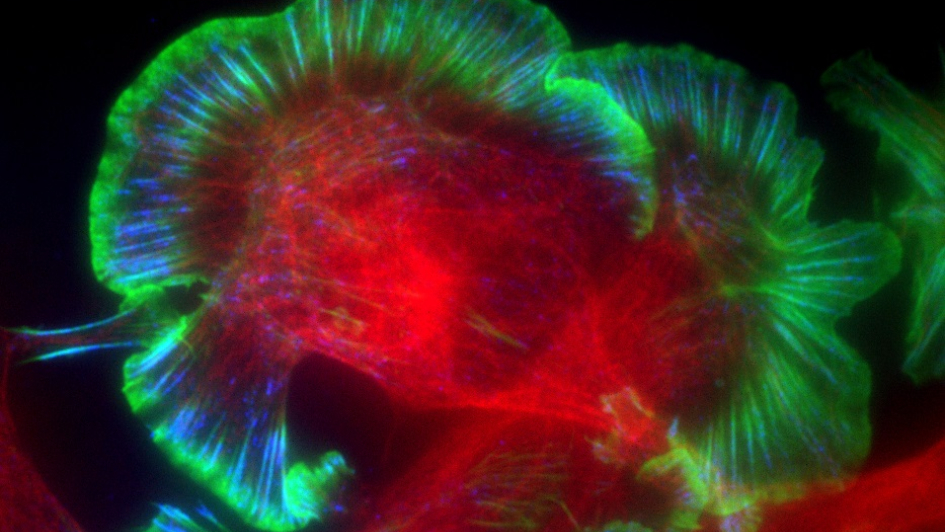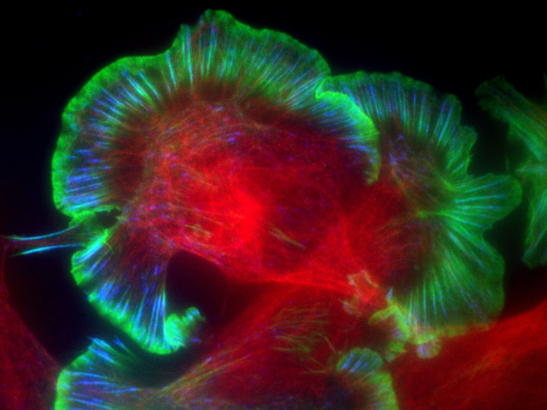
Image: Taken by Dr Chris Bakal, winner of the ICR’s annual science photography competition, shows metastatic melanoma cells as they feel their way through their environment, changing their shape to suit the tissue they are invading.
Looking down a large, state-of-the-art microscope in The Institute of Cancer Research's Chelsea laboratories, Dr Chris Bakal explains how technology is giving his team an unprecedented understanding of how cancer cells grow and spread.
Dr Bakal works on a skin cancer called melanoma – the fifth most common cancer in the UK, with around 16,000 newly diagnosed cases each year.
Scientists at the ICR have long been at the forefront of research to better understand melanoma, and our research is behind the discovery of some of the most important new treatments for the disease.
Dr Bakal is using a sophisticated ‘lattice light sheet’ microscope – purchased thanks to generous donations from our supporters – to illuminate melanoma cells in ultra-fine detail, and to generate many images at very high speed.
It is one of Dr Bakal’s instruments of choice in his latest research to understand how the shape of cancer cells influences their ability to spread round the body.
Dr Bakal explains: “The difference between a fatal and non-fatal cancer is usually its ability to spread around the body – a process called metastasis. We’re aiming to understand what makes some cancer cells, including melanomas, leave their original site and make that journey to other tissues and other parts of the body.”
Recent discoveries by Dr Bakal’s team include uncovering how melanoma cells ‘shape-shift’ by using a set of genes to change rapidly between two configurations, and developing a ‘postcode’ system to map proteins in cells that has shone more light on melanoma metastasis.
We know a melanoma cell’s ability to change shape is a crucial factor in its ability to spread. Metastatic cells can take on many shapes, squeezing through tissues and finding their way into places they should not naturally be, using a complex system of adhesion molecules on their surfaces to move around.
Dr Bakal took this image using a new ‘total internal reflection fluorescence’ microscope, which allows us to see cells at the point where they are making contact with their environment, and capture structures that would otherwise be difficult to see.
Drug discovery successes
Our researchers have also made breakthroughs that have helped transform treatment of melanoma. One of the ICR’s most high-profile successes of recent years was research to understand how mutations in a gene called BRAF could help cause the disease.
Our work in the laboratory led to the discovery of the BRAF-inhibiting drugs vemurafenib and dabrafenib, which are now mainstays of treatment for advanced melanoma, buying extra months or years for many thousands of patients around the world.
One of these drugs, dabrafenib, was discovered by a team in pharmaceutical company GlaxoSmithKline which included Dr Olivia Rossanese – who is now the Head of Biology in our Division of Cancer Therapeutics, working to find the next generation of cancer drugs.
Our success in discovering new drugs is underpinned by gaining a deeper understanding of the biological processes at work in cancer, as Dr Rossanese explains.
“What’s really important for us is to understand the underlying mechanisms and genetic alterations in cancer that lead to uncontrolled tumour growth and spread. And when we begin to understand those mechanisms, we really have a good idea of what the targets are for therapeutics.” That’s true for melanoma and other cancers.
Dr Rossanese’s team is due to move into our new flagship £75 million Centre for Cancer Drug Discovery in the first half of 2020. This new building will bring together some 280 world-leading researchers from drug discovery and evolutionary science under one roof to create new, resistance-busting treatments – against many different cancers, including melanoma
We need £14m to complete the building – and urgently need philanthropic support. Learn how you can support our major appeal to finish the ICR’s Centre for Cancer Drug Discovery.
Immunotherapy treatments for melanoma
ICR researchers are also leaders in the field of immunotherapy. Recent clinical trials involving our researchers alongside our hospital partner, The Royal Marsden NHS Foundation Trust, have led to the approval of new immunotherapies for patients on the NHS and worldwide to treat advanced melanoma and other cancers. These treatments have included talimogene laherparapvec (T-Vec), which is a highly innovative viral immunotherapy.
Professor Kevin Harrington, Professor of Biological Cancer Therapies at the ICR and Consultant Clinical Oncologist at The Royal Marsden, was the UK leader of the definitive trial that showed the benefits of this drug, which uses a genetically altered virus to burst cancer cells and attract the immune system to tumours.
Research at the ICR has led to vital new drugs to treat melanoma, and a better understanding of its biology than ever before. Our scientists are determined to keep on building on what is known about this disease, and find more new ways to treat it – and you can support them in their efforts by donating to our Centre for Cancer Drug Discovery Appeal.
